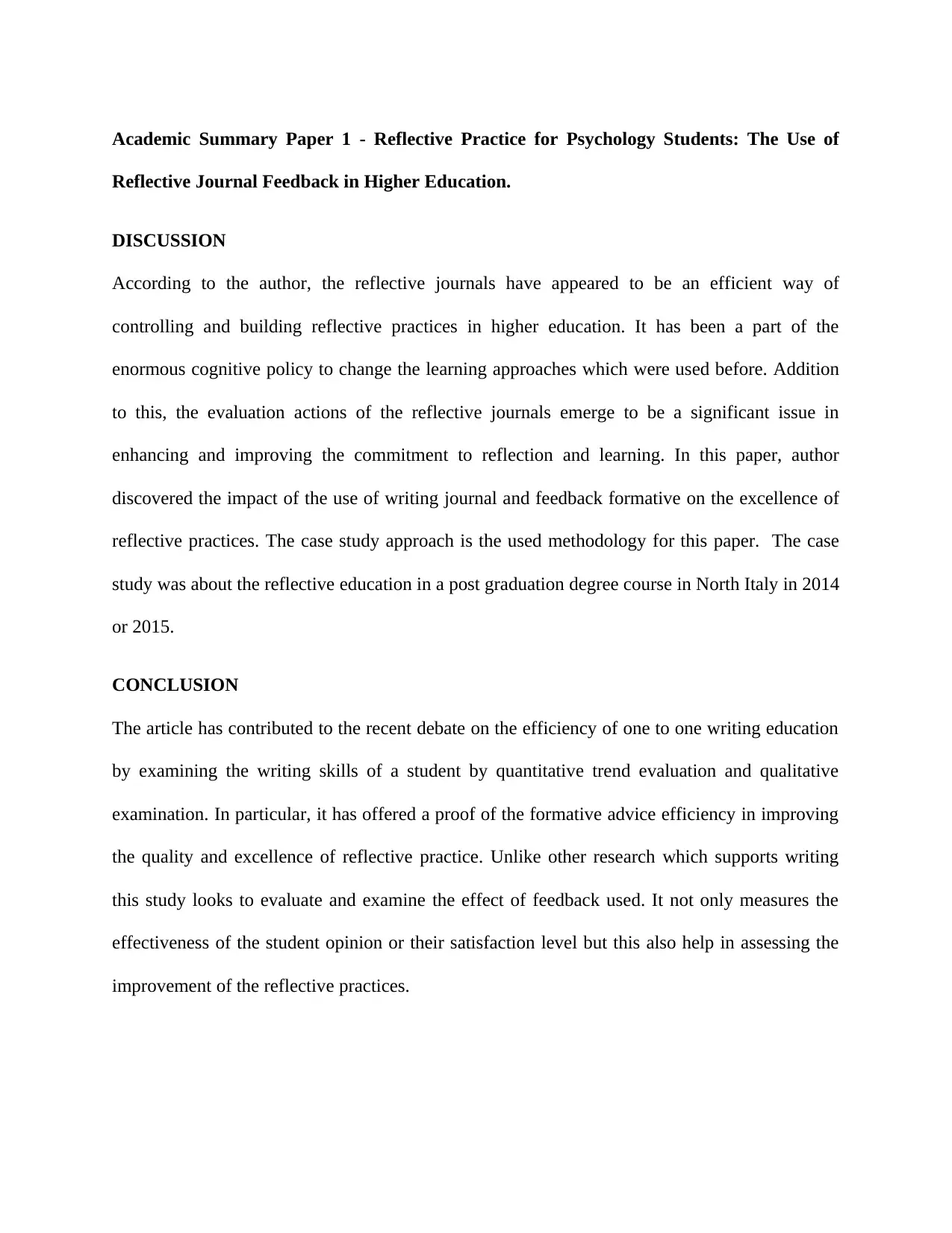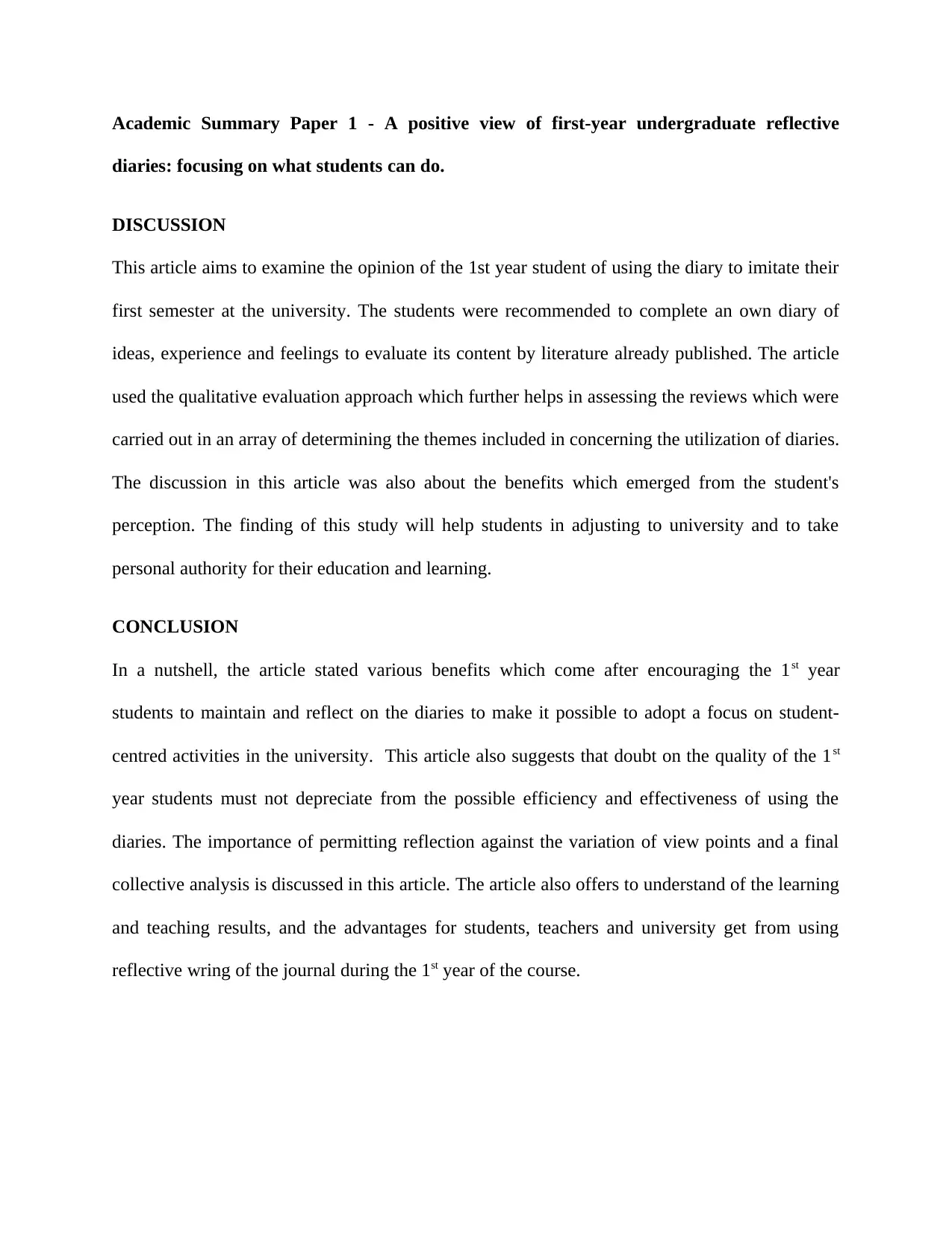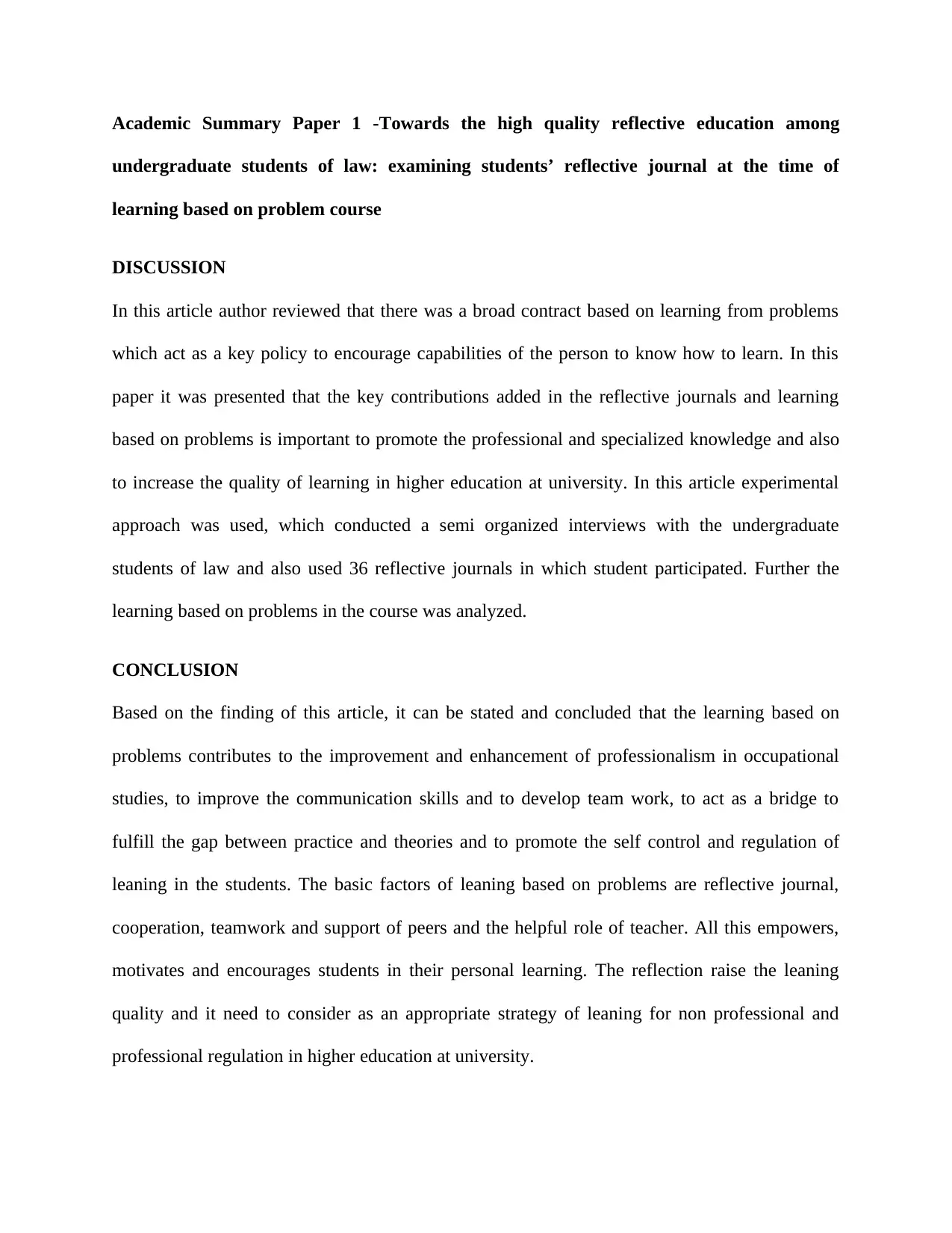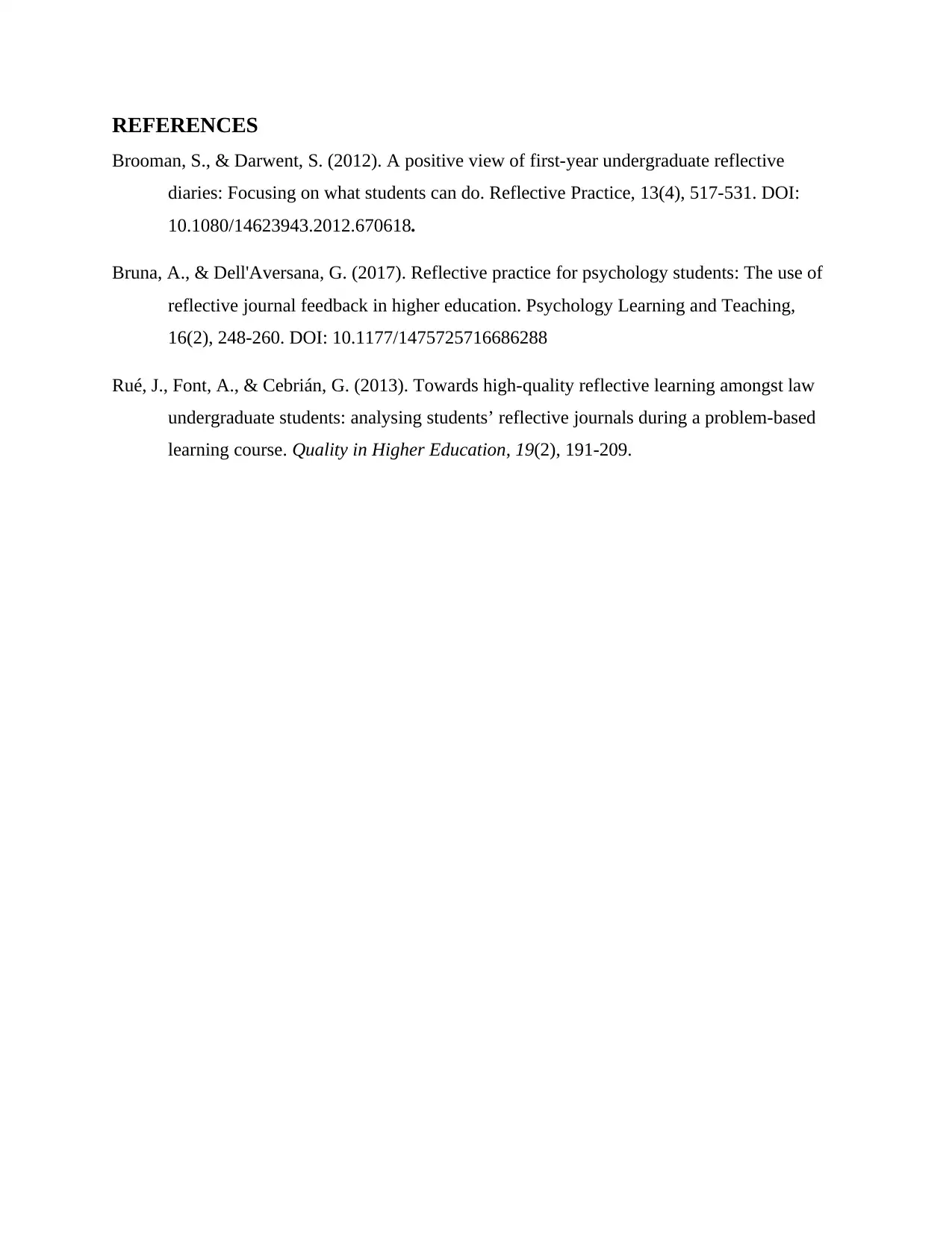Review of Reflective Journaling for Psychology Students' Education
VerifiedAdded on 2023/06/16
|4
|954
|492
Literature Review
AI Summary
This literature review summarizes three articles discussing the use of reflective journals in psychology education. The first article explores reflective journals as a method for controlling and building reflective practices in higher education, emphasizing the impact of feedback on reflective practice quality. The second article examines first-year students' perspectives on using diaries to reflect on their university experiences, highlighting the benefits of student-centered activities. The third article reviews the use of problem-based learning and reflective journals to promote professional knowledge and improve learning quality among law students. The review concludes that reflective journals, combined with feedback and problem-based learning, enhance student learning, professionalism, and reflective practice in higher education. Desklib offers a wide range of academic resources, including solved assignments and past papers, to support students in their studies.

Academic Summary Paper 1 - Reflective Practice for Psychology Students: The Use of
Reflective Journal Feedback in Higher Education.
DISCUSSION
According to the author, the reflective journals have appeared to be an efficient way of
controlling and building reflective practices in higher education. It has been a part of the
enormous cognitive policy to change the learning approaches which were used before. Addition
to this, the evaluation actions of the reflective journals emerge to be a significant issue in
enhancing and improving the commitment to reflection and learning. In this paper, author
discovered the impact of the use of writing journal and feedback formative on the excellence of
reflective practices. The case study approach is the used methodology for this paper. The case
study was about the reflective education in a post graduation degree course in North Italy in 2014
or 2015.
CONCLUSION
The article has contributed to the recent debate on the efficiency of one to one writing education
by examining the writing skills of a student by quantitative trend evaluation and qualitative
examination. In particular, it has offered a proof of the formative advice efficiency in improving
the quality and excellence of reflective practice. Unlike other research which supports writing
this study looks to evaluate and examine the effect of feedback used. It not only measures the
effectiveness of the student opinion or their satisfaction level but this also help in assessing the
improvement of the reflective practices.
Reflective Journal Feedback in Higher Education.
DISCUSSION
According to the author, the reflective journals have appeared to be an efficient way of
controlling and building reflective practices in higher education. It has been a part of the
enormous cognitive policy to change the learning approaches which were used before. Addition
to this, the evaluation actions of the reflective journals emerge to be a significant issue in
enhancing and improving the commitment to reflection and learning. In this paper, author
discovered the impact of the use of writing journal and feedback formative on the excellence of
reflective practices. The case study approach is the used methodology for this paper. The case
study was about the reflective education in a post graduation degree course in North Italy in 2014
or 2015.
CONCLUSION
The article has contributed to the recent debate on the efficiency of one to one writing education
by examining the writing skills of a student by quantitative trend evaluation and qualitative
examination. In particular, it has offered a proof of the formative advice efficiency in improving
the quality and excellence of reflective practice. Unlike other research which supports writing
this study looks to evaluate and examine the effect of feedback used. It not only measures the
effectiveness of the student opinion or their satisfaction level but this also help in assessing the
improvement of the reflective practices.
Paraphrase This Document
Need a fresh take? Get an instant paraphrase of this document with our AI Paraphraser

Academic Summary Paper 1 - A positive view of first-year undergraduate reflective
diaries: focusing on what students can do.
DISCUSSION
This article aims to examine the opinion of the 1st year student of using the diary to imitate their
first semester at the university. The students were recommended to complete an own diary of
ideas, experience and feelings to evaluate its content by literature already published. The article
used the qualitative evaluation approach which further helps in assessing the reviews which were
carried out in an array of determining the themes included in concerning the utilization of diaries.
The discussion in this article was also about the benefits which emerged from the student's
perception. The finding of this study will help students in adjusting to university and to take
personal authority for their education and learning.
CONCLUSION
In a nutshell, the article stated various benefits which come after encouraging the 1st year
students to maintain and reflect on the diaries to make it possible to adopt a focus on student-
centred activities in the university. This article also suggests that doubt on the quality of the 1st
year students must not depreciate from the possible efficiency and effectiveness of using the
diaries. The importance of permitting reflection against the variation of view points and a final
collective analysis is discussed in this article. The article also offers to understand of the learning
and teaching results, and the advantages for students, teachers and university get from using
reflective wring of the journal during the 1st year of the course.
diaries: focusing on what students can do.
DISCUSSION
This article aims to examine the opinion of the 1st year student of using the diary to imitate their
first semester at the university. The students were recommended to complete an own diary of
ideas, experience and feelings to evaluate its content by literature already published. The article
used the qualitative evaluation approach which further helps in assessing the reviews which were
carried out in an array of determining the themes included in concerning the utilization of diaries.
The discussion in this article was also about the benefits which emerged from the student's
perception. The finding of this study will help students in adjusting to university and to take
personal authority for their education and learning.
CONCLUSION
In a nutshell, the article stated various benefits which come after encouraging the 1st year
students to maintain and reflect on the diaries to make it possible to adopt a focus on student-
centred activities in the university. This article also suggests that doubt on the quality of the 1st
year students must not depreciate from the possible efficiency and effectiveness of using the
diaries. The importance of permitting reflection against the variation of view points and a final
collective analysis is discussed in this article. The article also offers to understand of the learning
and teaching results, and the advantages for students, teachers and university get from using
reflective wring of the journal during the 1st year of the course.

Academic Summary Paper 1 -Towards the high quality reflective education among
undergraduate students of law: examining students’ reflective journal at the time of
learning based on problem course
DISCUSSION
In this article author reviewed that there was a broad contract based on learning from problems
which act as a key policy to encourage capabilities of the person to know how to learn. In this
paper it was presented that the key contributions added in the reflective journals and learning
based on problems is important to promote the professional and specialized knowledge and also
to increase the quality of learning in higher education at university. In this article experimental
approach was used, which conducted a semi organized interviews with the undergraduate
students of law and also used 36 reflective journals in which student participated. Further the
learning based on problems in the course was analyzed.
CONCLUSION
Based on the finding of this article, it can be stated and concluded that the learning based on
problems contributes to the improvement and enhancement of professionalism in occupational
studies, to improve the communication skills and to develop team work, to act as a bridge to
fulfill the gap between practice and theories and to promote the self control and regulation of
leaning in the students. The basic factors of leaning based on problems are reflective journal,
cooperation, teamwork and support of peers and the helpful role of teacher. All this empowers,
motivates and encourages students in their personal learning. The reflection raise the leaning
quality and it need to consider as an appropriate strategy of leaning for non professional and
professional regulation in higher education at university.
undergraduate students of law: examining students’ reflective journal at the time of
learning based on problem course
DISCUSSION
In this article author reviewed that there was a broad contract based on learning from problems
which act as a key policy to encourage capabilities of the person to know how to learn. In this
paper it was presented that the key contributions added in the reflective journals and learning
based on problems is important to promote the professional and specialized knowledge and also
to increase the quality of learning in higher education at university. In this article experimental
approach was used, which conducted a semi organized interviews with the undergraduate
students of law and also used 36 reflective journals in which student participated. Further the
learning based on problems in the course was analyzed.
CONCLUSION
Based on the finding of this article, it can be stated and concluded that the learning based on
problems contributes to the improvement and enhancement of professionalism in occupational
studies, to improve the communication skills and to develop team work, to act as a bridge to
fulfill the gap between practice and theories and to promote the self control and regulation of
leaning in the students. The basic factors of leaning based on problems are reflective journal,
cooperation, teamwork and support of peers and the helpful role of teacher. All this empowers,
motivates and encourages students in their personal learning. The reflection raise the leaning
quality and it need to consider as an appropriate strategy of leaning for non professional and
professional regulation in higher education at university.
⊘ This is a preview!⊘
Do you want full access?
Subscribe today to unlock all pages.

Trusted by 1+ million students worldwide

REFERENCES
Brooman, S., & Darwent, S. (2012). A positive view of first-year undergraduate reflective
diaries: Focusing on what students can do. Reflective Practice, 13(4), 517-531. DOI:
10.1080/14623943.2012.670618.
Bruna, A., & Dell'Aversana, G. (2017). Reflective practice for psychology students: The use of
reflective journal feedback in higher education. Psychology Learning and Teaching,
16(2), 248-260. DOI: 10.1177/1475725716686288
Rué, J., Font, A., & Cebrián, G. (2013). Towards high-quality reflective learning amongst law
undergraduate students: analysing students’ reflective journals during a problem-based
learning course. Quality in Higher Education, 19(2), 191-209.
Brooman, S., & Darwent, S. (2012). A positive view of first-year undergraduate reflective
diaries: Focusing on what students can do. Reflective Practice, 13(4), 517-531. DOI:
10.1080/14623943.2012.670618.
Bruna, A., & Dell'Aversana, G. (2017). Reflective practice for psychology students: The use of
reflective journal feedback in higher education. Psychology Learning and Teaching,
16(2), 248-260. DOI: 10.1177/1475725716686288
Rué, J., Font, A., & Cebrián, G. (2013). Towards high-quality reflective learning amongst law
undergraduate students: analysing students’ reflective journals during a problem-based
learning course. Quality in Higher Education, 19(2), 191-209.
1 out of 4
Related Documents
Your All-in-One AI-Powered Toolkit for Academic Success.
+13062052269
info@desklib.com
Available 24*7 on WhatsApp / Email
![[object Object]](/_next/static/media/star-bottom.7253800d.svg)
Unlock your academic potential
Copyright © 2020–2026 A2Z Services. All Rights Reserved. Developed and managed by ZUCOL.




